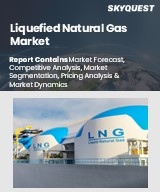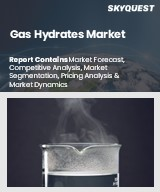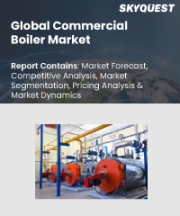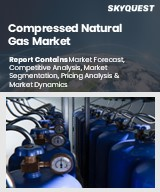
|
시장보고서
상품코드
1839245
에탄 시장 분석 및 예측(-2034년) : 유형, 제품, 용도, 기술, 최종 사용자, 프로세스, 성분, 장비, 솔루션, 형태Ethane Market Analysis and Forecast to 2034: Type, Product, Application, Technology, End User, Process, Component, Equipment, Solutions, Mode |
||||||
세계의 에탄 시장은 2024년 186억 달러에서 2034년까지 306억 달러로 확대되어 CAGR 약 5.1%를 보일 것으로 예측됩니다. 에탄 시장은 석유화학 산업의 주요 탄화수소인 에탄의 생산, 유통, 소비를 포함합니다. 주로 에틸렌 제조의 원료로 사용되는 에탄은 플라스틱, 부동액, 세제의 제조에 필수적입니다. 시장 성장의 원동력이 되고 있는 것은 셰일 가스의 채굴량 증가와 에틸렌 유도품 수요 증가입니다. 채굴 및 가공기술의 혁신이 효율성과 지속가능성을 높이고 있는 한편, 지정학적 요인과 규제의 변화가 시장 역학에 영향을 주고 있습니다.
에탄 시장은 석유화학 산업에서 매우 중요한 역할을 통해 강력한 성장을 이루고 있습니다. 에틸렌 생산 부문은 플라스틱 및 기타 유도 제품의 제조에 널리 사용되기 때문에 가장 호조적인 부문입니다. 이 부문의 이점은 다양한 소비자 및 산업 응용 분야에 필수적인 폴리에틸렌 수요 증가에 의해 뒷받침됩니다. 에탄이 저온 용도의 냉매로서 효율적이기 때문에 이 분야는 기세를 늘리고 있습니다. 이 분야는 냉각 기술의 발전과 에너지 효율적인 솔루션에 대한 수요 증가에 힘입어 큰 성장을 이루려고 합니다. 또한 대체 연료원으로 에탄의 이용이 증가하고 있는 운송 섹터도 큰 공헌을 하고 있습니다. 시장 확대는 기술 혁신과 생산 능력 증대와 공급망 최적화를 목표로 하는 전략적 투자에 의해 더욱 강화되고 급증하는 세계 수요를 충족하는 안정적인 공급을 확보하고 있습니다.
| 시장 세분화 | |
|---|---|
| 유형 | 천연 에탄, 합성 에탄 |
| 제품 | 에틸렌, 산화에틸렌, 이염화에틸렌, 에틸렌글리콜, 폴리에틸렌, 스티렌, 아세트산비닐 |
| 용도 | 석유화학 원료, 냉동, 용접가스, 화학 합성, 연료 |
| 기술 | 스팀 크래킹, 촉매 크래킹 |
| 최종 사용자 | 석유 화학 산업, 자동차, 포장, 섬유, 건설, 항공우주, 건강 관리 |
| 프로세스 | 분류, 개질, 분리 |
| 성분 | 순도 에탄, 에탄 혼합물 |
| 장비 | 분류기, 개질기, 압축기, 열 교환기 |
| 솔루션 | 현장 생산, 오프사이트 공급 |
| 형태 | 파이프라인, 유조선, 철도, 트럭 |
시장 현황
에탄 시장의 역학은 가격 전략과 제품 혁신의 진화에 따른 경쟁 구도를 밝혔습니다. 시장 리더는 전략적 제휴와 신제품 투입에 주력하여 제품 라인업의 충실을 도모하고 있습니다. 업계에서는 지속가능하고 효율적인 가공기술로의 변화를 볼 수 있습니다. 가격 설정은 여전히 원료 비용과 지정학적 요인에 따라 달라집니다. 북미는 풍부한 셰일가스 매장량으로 견인되어 시장을 독점하고 있지만 아시아태평양은 석유화학산업 수요 증가로 유망한 성장을 보이고 있습니다. 에탄 시장 경쟁은 치열하며 주요 기업들이 기술 혁신과 전략적 제휴를 통해 시장 패권을 다투고 있습니다. 특히 북미와 유럽의 규제 체제는 운영 기준과 환경 규정 준수에 영향을 미칩니다. 이러한 규제는 기업에 보다 깨끗한 기술과 지속 가능한 관행의 채용을 촉구하고 있습니다. 이 시장은 기술의 진보와 탄소 실적의 삭감에 중점을 두고 있는 것이 특징입니다. 규제환경이 진화하고 석유화학 생산의 원료로서 에탄 수요가 높아지고 있는 신흥 시장에는 비즈니스 기회가 풍부합니다.
주요 동향과 촉진요인
에탄 시장은 주요 석유화학 제품인 에틸렌 생산 수요 증가에 힘입어 강력한 성장을 이루고 있습니다. 특히 북미에서의 셰일가스 채굴의 급증은 풍부한 에탄 공급을 가져와 시장 확대를 뒷받침하고 있습니다. 채굴 및 처리에서의 기술의 진보는 효율을 높이고, 비용을 삭감하고, 생산 능력을 증강하고 있습니다. 보다 깨끗한 에너지원으로의 세계 이동은 대체 에너지에 비해 탄소 배출량이 적기 때문에 원료로서의 에탄 수요를 촉진하고 있습니다. 게다가 신흥국의 급속한 산업화가 에틸렌계 제품의 요구를 높이고 있어 에탄 시장을 더욱 촉진하고 있습니다. 파이프라인 및 저장 시설과 같은 인프라 개발에 대한 전략적 투자는 공급망의 원활한 운영을 촉진하고 있습니다. 기업은 미개척 시장을 활용하기 위해 지역 실적을 확대하는 데 점점 더 주력하고 있습니다. 에탄 시장은 이러한 역동적인 동향과 전략적 이니셔티브에 견인되어 큰 성장을 이루려고 합니다.
억제와 도전:
에탄 시장은 현재 몇 가지 중요한 시장 성장 억제요인과 문제에 직면하고 있습니다. 첫 번째 우려는 원유 가격의 변동입니다. 에탄 생산은 원유와 밀접하게 연결되어 있으며, 그 변동은 공급망을 혼란스럽게 만들고 가격 안정성에 영향을 미칠 수 있습니다. 환경 규제도 엄청난 과제입니다. 배출가스와 지속가능성에 대한 정책이 강화되어 운영비용이 상승하고 보다 깨끗한 기술에 대한 투자가 필요합니다. 특히 개발도상지역에서는 인프라 제약이 효율적인 에탄 채굴과 수송을 방해하고 있습니다. 인프라 부족은 병목 현상과 경비 증가로 이어집니다. 시장 경쟁은 격화되고 있으며, 프로판 등 대체 원료가 인기를 끌고 있습니다. 이러한 경쟁은 시장 점유율을 낮추고 이익률을 낮출 수 있습니다. 마지막으로, 지정학적 긴장은 공급 경로를 불안정하게 하고, 세계 무역역학에 영향을 주고, 시장 안정성에 위험을 초래할 수 있습니다. 이러한 요인은 에탄 시장의 성장과 확대에 큰 장애물입니다.
주요 기업
SABIC, LyondellBasell, INEOS, Westlake Chemical, Sasol, Reliance Industries, Formosa Plastics, Oriental Energy, Shin-Etsu Chemical, PTT Global Chemical, Braskem, NOVA Chemicals, Versalis, Huntsman Corporation, Celanese Corporation
목차
제1장 에탄 시장 개요
- 조사 목적
- 에탄 시장 정의와 조사 범위
- 보고서의 제한 사항
- 조사 대상 연도와 통화
- 조사 방법
제2장 주요 요약
제3장 시장에 관한 중요 인사이트
제4장 에탄 시장 전망
- 에탄 시장의 세분화
- 시장 역학
- Porter's Five Forces 분석
- PESTLE 분석
- 밸류체인 분석
- 4P 모델
- ANSOFF 매트릭스
제5장 에탄 시장 전략
- 상위 시장 분석
- 수급 분석
- 소비자의 구매 의욕
- 사례 연구 분석
- 가격 분석
- 규제 상황
- 공급망 분석
- 경쟁 제품 분석
- 최근 동향
제6장 에탄 시장 규모
- 에탄 시장 규모 : 금액별
- 에탄 시장 규모 : 수량별
제7장 에탄 시장 : 유형별
- 시장 개요
- 천연 에탄
- 합성 에탄
- 기타
제8장 에탄 시장 : 제품별
- 시장 개요
- 에틸렌
- 산화에틸렌
- 이염화에틸렌
- 에틸렌글리콜
- 폴리에틸렌
- 스티렌
- 비닐 아세테이트
- 기타
제9장 에탄 시장 : 용도별
- 시장 개요
- 석유화학 원료
- 냉동
- 용접 가스
- 화학합성
- 연료
- 기타
제10장 에탄 시장 : 기술별
- 시장 개요
- 스팀 크래킹
- 촉매 크래킹
- 기타
제11장 에탄 시장 : 최종 사용자별
- 시장 개요
- 석유화학산업
- 자동차산업
- 포장
- 섬유
- 건설
- 항공우주
- 헬스케어
- 기타
제12장 에탄 시장 : 프로세스별
- 시장 개요
- 분류
- 개질
- 분리
- 기타
제13장 에탄 시장 : 성분별
- 시장 개요
- 순도 에탄
- 혼합 에탄
- 기타
제14장 에탄 시장 : 기기별
- 시장 개요
- 분류기
- 개질기
- 압축기
- 열 교환기
- 기타
제15장 에탄 시장 : 솔루션별
- 시장 개요
- 현장 생산
- 오프사이트 공급
- 기타
제16장 에탄 시장 : 형태별
- 시장 개요
- 파이프라인
- 유조선
- 철도
- 트럭
- 기타
제17장 에탄 시장 : 지역별
- 개요
- 북미
- 미국
- 캐나다
- 유럽
- 영국
- 독일
- 프랑스
- 스페인
- 이탈리아
- 네덜란드
- 스웨덴
- 스위스
- 덴마크
- 핀란드
- 러시아
- 기타 유럽
- 아시아태평양
- 중국
- 인도
- 일본
- 한국
- 호주
- 싱가포르
- 인도네시아
- 대만
- 말레이시아
- 기타 아시아태평양
- 라틴아메리카
- 브라질
- 멕시코
- 아르헨티나
- 기타 라틴아메리카
- 중동 및 아프리카
- 사우디아라비아
- 아랍에미리트(UAE)
- 남아프리카
- 기타 중동 및 아프리카
제18장 경쟁 구도
- 개요
- 시장 점유율 분석
- 주요 기업의 포지셔닝
- 경쟁 리더십 매핑
- 벤더 벤치마킹
- 개발 전략의 벤치마킹
제19장 기업 프로파일
- SABIC
- LyondellBasell
- INEOS
- Westlake Chemical
- Sasol
- Reliance Industries
- Formosa Plastics
- Oriental Energy
- Shin-Etsu Chemical
- PTT Global Chemical
- Braskem
- NOVA Chemicals
- Versalis
- Huntsman Corporation
- Celanese Corporation
Ethane Market is anticipated to expand from $18.6 billion in 2024 to $30.6 billion by 2034, growing at a CAGR of approximately 5.1%. The Ethane Market encompasses the production, distribution, and consumption of ethane, a key hydrocarbon in the petrochemical industry. Primarily used as a feedstock for ethylene production, ethane is crucial for manufacturing plastics, antifreeze, and detergents. Market growth is driven by increased shale gas extraction and rising demand for ethylene derivatives. Innovations in extraction and processing technologies are enhancing efficiency and sustainability, while geopolitical factors and regulatory changes influence market dynamics.
The Ethane Market is experiencing robust growth, largely fueled by its pivotal role in the petrochemical industry. The ethylene production segment is the top-performing sector, driven by its extensive use in manufacturing plastics and other derivatives. This segment's dominance is underpinned by the rising demand for polyethylene, which is integral to various consumer and industrial applications. Following closely is the refrigeration segment, which is gaining momentum due to ethane's efficiency as a refrigerant in low-temperature applications. This segment is poised for substantial growth, propelled by advancements in cooling technologies and increased demand for energy-efficient solutions. Additionally, the transportation sector is emerging as a significant contributor, with ethane being increasingly utilized as an alternative fuel source. The market's expansion is further supported by technological innovations and strategic investments aimed at enhancing production capacities and optimizing supply chains, ensuring a steady supply to meet burgeoning global demand.
| Market Segmentation | |
|---|---|
| Type | Natural Ethane, Synthetic Ethane |
| Product | Ethylene, Ethylene Oxide, Ethylene Dichloride, Ethylene Glycol, Polyethylene, Styrene, Vinyl Acetate |
| Application | Petrochemical Feedstock, Refrigeration, Welding Gas, Chemical Synthesis, Fuel |
| Technology | Steam Cracking, Catalytic Cracking |
| End User | Petrochemical Industry, Automotive, Packaging, Textile, Construction, Aerospace, Healthcare |
| Process | Fractionation, Reforming, Separation |
| Component | Purity Ethane, Ethane Mixtures |
| Equipment | Fractionators, Reformers, Compressors, Heat Exchangers |
| Solutions | Onsite Production, Offsite Supply |
| Mode | Pipeline, Tanker, Rail, Truck |
Market Snapshot:
Ethane market dynamics reveal a competitive landscape with evolving pricing strategies and product innovations. Market leaders are focusing on strategic alliances and new product launches to enhance their offerings. The industry is witnessing a shift towards sustainable and efficient processing technologies. Pricing remains influenced by raw material costs and geopolitical factors. North America dominates the market, driven by abundant shale gas reserves, while Asia-Pacific shows promising growth due to increasing demand in petrochemical industries. Competition in the ethane market is fierce, with key players vying for market dominance through innovation and strategic partnerships. Regulatory frameworks, particularly in North America and Europe, impact operational standards and environmental compliance. These regulations drive companies to adopt cleaner technologies and sustainable practices. The market is characterized by technological advancements and a focus on reducing carbon footprints. Opportunities abound in emerging markets, where regulatory environments are evolving, and demand for ethane as a feedstock in petrochemical production is rising.
Geographical Overview:
The ethane market is witnessing notable growth across various regions, each exhibiting unique characteristics. North America leads the market, driven by abundant shale gas reserves and established petrochemical industries. The region's robust infrastructure and technological advancements further bolster its market position. In Europe, the market is expanding steadily, with a focus on sustainable practices and stringent environmental regulations. The continent's commitment to reducing carbon emissions enhances the appeal of ethane as a cleaner alternative. In Asia Pacific, rapid industrialization and urbanization are propelling the ethane market forward. China and India are emerging as key players, fueled by their growing petrochemical sectors and increasing demand for plastics. Latin America and the Middle East & Africa are also showing promising growth. In Latin America, Brazil is becoming a significant market due to its expanding industrial base. Meanwhile, the Middle East & Africa are capitalizing on vast natural gas reserves, with countries like Saudi Arabia and Qatar leading the charge. These regions are recognizing ethane's potential in driving economic growth and diversification.
Key Trends and Drivers:
The ethane market is experiencing robust growth, propelled by increasing demand for ethylene production, a key petrochemical. The surge in shale gas extraction, particularly in North America, is providing an abundant supply of ethane, driving market expansion. Technological advancements in extraction and processing are enhancing efficiency, reducing costs, and boosting production capacities. The global shift towards cleaner energy sources is fostering demand for ethane as a feedstock, due to its lower carbon emissions compared to alternatives. Additionally, the rapid industrialization in emerging economies is escalating the need for ethylene-based products, further propelling the ethane market. Strategic investments in infrastructure development, such as pipelines and storage facilities, are facilitating smoother supply chain operations. Companies are increasingly focusing on expanding their geographical footprint to capitalize on untapped markets. The ethane market is poised for significant growth, driven by these dynamic trends and strategic initiatives.
Restraints and Challenges:
The ethane market is currently grappling with several significant restraints and challenges. A primary concern is the volatility of crude oil prices. Ethane production is closely tied to crude oil, and fluctuations can disrupt supply chains and affect pricing stability. Environmental regulations present another formidable challenge. Stricter policies on emissions and sustainability are increasing operational costs and necessitating investments in cleaner technologies. Infrastructure limitations, particularly in developing regions, hinder efficient ethane extraction and transportation. This lack of infrastructure can lead to bottlenecks and increased expenses. Market competition is intensifying, with alternative feedstocks such as propane gaining traction. This competition can erode market share and compress profit margins. Lastly, geopolitical tensions can destabilize supply routes and impact global trade dynamics, posing risks to market stability. These factors collectively present substantial hurdles to the growth and expansion of the ethane market.
Key Players:
SABIC, LyondellBasell, INEOS, Westlake Chemical, Sasol, Reliance Industries, Formosa Plastics, Oriental Energy, Shin-Etsu Chemical, PTT Global Chemical, Braskem, NOVA Chemicals, Versalis, Huntsman Corporation, Celanese Corporation
Research Scope:
- Estimates and forecasts the overall market size across type, application, and region.
- Provides detailed information and key takeaways on qualitative and quantitative trends, dynamics, business framework, competitive landscape, and company profiling.
- Identifies factors influencing market growth and challenges, opportunities, drivers, and restraints.
- Identifies factors that could limit company participation in international markets to help calibrate market share expectations and growth rates.
- Evaluates key development strategies like acquisitions, product launches, mergers, collaborations, business expansions, agreements, partnerships, and R&D activities.
- Analyzes smaller market segments strategically, focusing on their potential, growth patterns, and impact on the overall market.
- Outlines the competitive landscape, assessing business and corporate strategies to monitor and dissect competitive advancements.
Our research scope provides comprehensive market data, insights, and analysis across a variety of critical areas. We cover Local Market Analysis, assessing consumer demographics, purchasing behaviors, and market size within specific regions to identify growth opportunities. Our Local Competition Review offers a detailed evaluation of competitors, including their strengths, weaknesses, and market positioning. We also conduct Local Regulatory Reviews to ensure businesses comply with relevant laws and regulations. Industry Analysis provides an in-depth look at market dynamics, key players, and trends. Additionally, we offer Cross-Segmental Analysis to identify synergies between different market segments, as well as Production-Consumption and Demand-Supply Analysis to optimize supply chain efficiency. Our Import-Export Analysis helps businesses navigate global trade environments by evaluating trade flows and policies. These insights empower clients to make informed strategic decisions, mitigate risks, and capitalize on market opportunities.
TABLE OF CONTENTS
1: Ethane Market Overview
- 1.1 Objectives of the Study
- 1.2 Ethane Market Definition and Scope of the Report
- 1.3 Report Limitations
- 1.4 Years & Currency Considered in the Study
- 1.5 Research Methodologies
- 1.5.1 Secondary Research
- 1.5.2 Primary Research
- 1.5.3 Market Size Estimation: Top-Down Approach
- 1.5.4 Market Size Estimation: Bottom-Up Approach
- 1.5.5 Data Triangulation and Validation
2: Executive Summary
- 2.1 Summary
- 2.2 Key Opinion Leaders
- 2.3 Key Highlights of the Market, by Type
- 2.4 Key Highlights of the Market, by Product
- 2.5 Key Highlights of the Market, by Application
- 2.6 Key Highlights of the Market, by Technology
- 2.7 Key Highlights of the Market, by End User
- 2.8 Key Highlights of the Market, by Process
- 2.9 Key Highlights of the Market, by Component
- 2.10 Key Highlights of the Market, by Equipment
- 2.11 Key Highlights of the Market, by Solutions
- 2.12 Key Highlights of the Market, by Mode
- 2.13 Key Highlights of the Market, by North America
- 2.14 Key Highlights of the Market, by Europe
- 2.15 Key Highlights of the Market, by Asia-Pacific
- 2.16 Key Highlights of the Market, by Latin America
- 2.17 Key Highlights of the Market, by Middle East
- 2.18 Key Highlights of the Market, by Africa
3: Premium Insights on the Market
- 3.1 Market Attractiveness Analysis, by Region
- 3.2 Market Attractiveness Analysis, by Type
- 3.3 Market Attractiveness Analysis, by Product
- 3.4 Market Attractiveness Analysis, by Application
- 3.5 Market Attractiveness Analysis, by Technology
- 3.6 Market Attractiveness Analysis, by End User
- 3.7 Market Attractiveness Analysis, by Process
- 3.8 Market Attractiveness Analysis, by Component
- 3.9 Market Attractiveness Analysis, by Equipment
- 3.10 Market Attractiveness Analysis, by Solutions
- 3.11 Market Attractiveness Analysis, by Mode
- 3.12 Market Attractiveness Analysis, by North America
- 3.13 Market Attractiveness Analysis, by Europe
- 3.14 Market Attractiveness Analysis, by Asia-Pacific
- 3.15 Market Attractiveness Analysis, by Latin America
- 3.16 Market Attractiveness Analysis, by Middle East
- 3.17 Market Attractiveness Analysis, by Africa
4: Ethane Market Outlook
- 4.1 Ethane Market Segmentation
- 4.2 Market Dynamics
- 4.2.1 Market Drivers
- 4.2.2 Market Trends
- 4.2.3 Market Restraints
- 4.2.4 Market Opportunities
- 4.3 Porters Five Forces Analysis
- 4.3.1 Threat of New Entrants
- 4.3.2 Threat of Substitutes
- 4.3.3 Bargaining Power of Buyers
- 4.3.4 Bargaining Power of Supplier
- 4.3.5 Competitive Rivalry
- 4.4 PESTLE Analysis
- 4.5 Value Chain Analysis
- 4.6 4Ps Model
- 4.7 ANSOFF Matrix
5: Ethane Market Strategy
- 5.1 Parent Market Analysis
- 5.2 Supply-Demand Analysis
- 5.3 Consumer Buying Interest
- 5.4 Case Study Analysis
- 5.5 Pricing Analysis
- 5.6 Regulatory Landscape
- 5.7 Supply Chain Analysis
- 5.8 Competition Product Analysis
- 5.9 Recent Developments
6: Ethane Market Size
- 6.1 Ethane Market Size, by Value
- 6.2 Ethane Market Size, by Volume
7: Ethane Market, by Type
- 7.1 Market Overview
- 7.2 Natural Ethane
- 7.2.1 Key Market Trends & Opportunity Analysis
- 7.2.2 Market Size and Forecast, by Region
- 7.3 Synthetic Ethane
- 7.3.1 Key Market Trends & Opportunity Analysis
- 7.3.2 Market Size and Forecast, by Region
- 7.4 Others
- 7.4.1 Key Market Trends & Opportunity Analysis
- 7.4.2 Market Size and Forecast, by Region
8: Ethane Market, by Product
- 8.1 Market Overview
- 8.2 Ethylene
- 8.2.1 Key Market Trends & Opportunity Analysis
- 8.2.2 Market Size and Forecast, by Region
- 8.3 Ethylene Oxide
- 8.3.1 Key Market Trends & Opportunity Analysis
- 8.3.2 Market Size and Forecast, by Region
- 8.4 Ethylene Dichloride
- 8.4.1 Key Market Trends & Opportunity Analysis
- 8.4.2 Market Size and Forecast, by Region
- 8.5 Ethylene Glycol
- 8.5.1 Key Market Trends & Opportunity Analysis
- 8.5.2 Market Size and Forecast, by Region
- 8.6 Polyethylene
- 8.6.1 Key Market Trends & Opportunity Analysis
- 8.6.2 Market Size and Forecast, by Region
- 8.7 Styrene
- 8.7.1 Key Market Trends & Opportunity Analysis
- 8.7.2 Market Size and Forecast, by Region
- 8.8 Vinyl Acetate
- 8.8.1 Key Market Trends & Opportunity Analysis
- 8.8.2 Market Size and Forecast, by Region
- 8.9 Others
- 8.9.1 Key Market Trends & Opportunity Analysis
- 8.9.2 Market Size and Forecast, by Region
9: Ethane Market, by Application
- 9.1 Market Overview
- 9.2 Petrochemical Feedstock
- 9.2.1 Key Market Trends & Opportunity Analysis
- 9.2.2 Market Size and Forecast, by Region
- 9.3 Refrigeration
- 9.3.1 Key Market Trends & Opportunity Analysis
- 9.3.2 Market Size and Forecast, by Region
- 9.4 Welding Gas
- 9.4.1 Key Market Trends & Opportunity Analysis
- 9.4.2 Market Size and Forecast, by Region
- 9.5 Chemical Synthesis
- 9.5.1 Key Market Trends & Opportunity Analysis
- 9.5.2 Market Size and Forecast, by Region
- 9.6 Fuel
- 9.6.1 Key Market Trends & Opportunity Analysis
- 9.6.2 Market Size and Forecast, by Region
- 9.7 Others
- 9.7.1 Key Market Trends & Opportunity Analysis
- 9.7.2 Market Size and Forecast, by Region
10: Ethane Market, by Technology
- 10.1 Market Overview
- 10.2 Steam Cracking
- 10.2.1 Key Market Trends & Opportunity Analysis
- 10.2.2 Market Size and Forecast, by Region
- 10.3 Catalytic Cracking
- 10.3.1 Key Market Trends & Opportunity Analysis
- 10.3.2 Market Size and Forecast, by Region
- 10.4 Others
- 10.4.1 Key Market Trends & Opportunity Analysis
- 10.4.2 Market Size and Forecast, by Region
11: Ethane Market, by End User
- 11.1 Market Overview
- 11.2 Petrochemical Industry
- 11.2.1 Key Market Trends & Opportunity Analysis
- 11.2.2 Market Size and Forecast, by Region
- 11.3 Automotive
- 11.3.1 Key Market Trends & Opportunity Analysis
- 11.3.2 Market Size and Forecast, by Region
- 11.4 Packaging
- 11.4.1 Key Market Trends & Opportunity Analysis
- 11.4.2 Market Size and Forecast, by Region
- 11.5 Textile
- 11.5.1 Key Market Trends & Opportunity Analysis
- 11.5.2 Market Size and Forecast, by Region
- 11.6 Construction
- 11.6.1 Key Market Trends & Opportunity Analysis
- 11.6.2 Market Size and Forecast, by Region
- 11.7 Aerospace
- 11.7.1 Key Market Trends & Opportunity Analysis
- 11.7.2 Market Size and Forecast, by Region
- 11.8 Healthcare
- 11.8.1 Key Market Trends & Opportunity Analysis
- 11.8.2 Market Size and Forecast, by Region
- 11.9 Others
- 11.9.1 Key Market Trends & Opportunity Analysis
- 11.9.2 Market Size and Forecast, by Region
12: Ethane Market, by Process
- 12.1 Market Overview
- 12.2 Fractionation
- 12.2.1 Key Market Trends & Opportunity Analysis
- 12.2.2 Market Size and Forecast, by Region
- 12.3 Reforming
- 12.3.1 Key Market Trends & Opportunity Analysis
- 12.3.2 Market Size and Forecast, by Region
- 12.4 Separation
- 12.4.1 Key Market Trends & Opportunity Analysis
- 12.4.2 Market Size and Forecast, by Region
- 12.5 Others
- 12.5.1 Key Market Trends & Opportunity Analysis
- 12.5.2 Market Size and Forecast, by Region
13: Ethane Market, by Component
- 13.1 Market Overview
- 13.2 Purity Ethane
- 13.2.1 Key Market Trends & Opportunity Analysis
- 13.2.2 Market Size and Forecast, by Region
- 13.3 Ethane Mixtures
- 13.3.1 Key Market Trends & Opportunity Analysis
- 13.3.2 Market Size and Forecast, by Region
- 13.4 Others
- 13.4.1 Key Market Trends & Opportunity Analysis
- 13.4.2 Market Size and Forecast, by Region
14: Ethane Market, by Equipment
- 14.1 Market Overview
- 14.2 Fractionators
- 14.2.1 Key Market Trends & Opportunity Analysis
- 14.2.2 Market Size and Forecast, by Region
- 14.3 Reformers
- 14.3.1 Key Market Trends & Opportunity Analysis
- 14.3.2 Market Size and Forecast, by Region
- 14.4 Compressors
- 14.4.1 Key Market Trends & Opportunity Analysis
- 14.4.2 Market Size and Forecast, by Region
- 14.5 Heat Exchangers
- 14.5.1 Key Market Trends & Opportunity Analysis
- 14.5.2 Market Size and Forecast, by Region
- 14.6 Others
- 14.6.1 Key Market Trends & Opportunity Analysis
- 14.6.2 Market Size and Forecast, by Region
15: Ethane Market, by Solutions
- 15.1 Market Overview
- 15.2 Onsite Production
- 15.2.1 Key Market Trends & Opportunity Analysis
- 15.2.2 Market Size and Forecast, by Region
- 15.3 Offsite Supply
- 15.3.1 Key Market Trends & Opportunity Analysis
- 15.3.2 Market Size and Forecast, by Region
- 15.4 Others
- 15.4.1 Key Market Trends & Opportunity Analysis
- 15.4.2 Market Size and Forecast, by Region
16: Ethane Market, by Mode
- 16.1 Market Overview
- 16.2 Pipeline
- 16.2.1 Key Market Trends & Opportunity Analysis
- 16.2.2 Market Size and Forecast, by Region
- 16.3 Tanker
- 16.3.1 Key Market Trends & Opportunity Analysis
- 16.3.2 Market Size and Forecast, by Region
- 16.4 Rail
- 16.4.1 Key Market Trends & Opportunity Analysis
- 16.4.2 Market Size and Forecast, by Region
- 16.5 Truck
- 16.5.1 Key Market Trends & Opportunity Analysis
- 16.5.2 Market Size and Forecast, by Region
- 16.6 Others
- 16.6.1 Key Market Trends & Opportunity Analysis
- 16.6.2 Market Size and Forecast, by Region
17: Ethane Market, by Region
- 17.1 Overview
- 17.2 North America
- 17.2.1 Key Market Trends and Opportunities
- 17.2.2 North America Market Size and Forecast, by Type
- 17.2.3 North America Market Size and Forecast, by Product
- 17.2.4 North America Market Size and Forecast, by Application
- 17.2.5 North America Market Size and Forecast, by Technology
- 17.2.6 North America Market Size and Forecast, by End User
- 17.2.7 North America Market Size and Forecast, by Process
- 17.2.8 North America Market Size and Forecast, by Component
- 17.2.9 North America Market Size and Forecast, by Equipment
- 17.2.10 North America Market Size and Forecast, by Solutions
- 17.2.11 North America Market Size and Forecast, by Mode
- 17.2.12 North America Market Size and Forecast, by Country
- 17.2.13 United States
- 17.2.9.1 United States Market Size and Forecast, by Type
- 17.2.9.2 United States Market Size and Forecast, by Product
- 17.2.9.3 United States Market Size and Forecast, by Application
- 17.2.9.4 United States Market Size and Forecast, by Technology
- 17.2.9.5 United States Market Size and Forecast, by End User
- 17.2.9.6 United States Market Size and Forecast, by Process
- 17.2.9.7 United States Market Size and Forecast, by Component
- 17.2.9.8 United States Market Size and Forecast, by Equipment
- 17.2.9.9 United States Market Size and Forecast, by Solutions
- 17.2.9.10 United States Market Size and Forecast, by Mode
- 17.2.9.11 Local Competition Analysis
- 17.2.9.12 Local Market Analysis
- 17.2.1 Canada
- 17.2.10.1 Canada Market Size and Forecast, by Type
- 17.2.10.2 Canada Market Size and Forecast, by Product
- 17.2.10.3 Canada Market Size and Forecast, by Application
- 17.2.10.4 Canada Market Size and Forecast, by Technology
- 17.2.10.5 Canada Market Size and Forecast, by End User
- 17.2.10.6 Canada Market Size and Forecast, by Process
- 17.2.10.7 Canada Market Size and Forecast, by Component
- 17.2.10.8 Canada Market Size and Forecast, by Equipment
- 17.2.10.9 Canada Market Size and Forecast, by Solutions
- 17.2.10.10 Canada Market Size and Forecast, by Mode
- 17.2.10.11 Local Competition Analysis
- 17.2.10.12 Local Market Analysis
- 17.1 Europe
- 17.3.1 Key Market Trends and Opportunities
- 17.3.2 Europe Market Size and Forecast, by Type
- 17.3.3 Europe Market Size and Forecast, by Product
- 17.3.4 Europe Market Size and Forecast, by Application
- 17.3.5 Europe Market Size and Forecast, by Technology
- 17.3.6 Europe Market Size and Forecast, by End User
- 17.3.7 Europe Market Size and Forecast, by Process
- 17.3.8 Europe Market Size and Forecast, by Component
- 17.3.9 Europe Market Size and Forecast, by Equipment
- 17.3.10 Europe Market Size and Forecast, by Solutions
- 17.3.11 Europe Market Size and Forecast, by Mode
- 17.3.12 Europe Market Size and Forecast, by Country
- 17.3.13 United Kingdom
- 17.3.9.1 United Kingdom Market Size and Forecast, by Type
- 17.3.9.2 United Kingdom Market Size and Forecast, by Product
- 17.3.9.3 United Kingdom Market Size and Forecast, by Application
- 17.3.9.4 United Kingdom Market Size and Forecast, by Technology
- 17.3.9.5 United Kingdom Market Size and Forecast, by End User
- 17.3.9.6 United Kingdom Market Size and Forecast, by Process
- 17.3.9.7 United Kingdom Market Size and Forecast, by Component
- 17.3.9.8 United Kingdom Market Size and Forecast, by Equipment
- 17.3.9.9 United Kingdom Market Size and Forecast, by Solutions
- 17.3.9.10 United Kingdom Market Size and Forecast, by Mode
- 17.3.9.11 Local Competition Analysis
- 17.3.9.12 Local Market Analysis
- 17.3.1 Germany
- 17.3.10.1 Germany Market Size and Forecast, by Type
- 17.3.10.2 Germany Market Size and Forecast, by Product
- 17.3.10.3 Germany Market Size and Forecast, by Application
- 17.3.10.4 Germany Market Size and Forecast, by Technology
- 17.3.10.5 Germany Market Size and Forecast, by End User
- 17.3.10.6 Germany Market Size and Forecast, by Process
- 17.3.10.7 Germany Market Size and Forecast, by Component
- 17.3.10.8 Germany Market Size and Forecast, by Equipment
- 17.3.10.9 Germany Market Size and Forecast, by Solutions
- 17.3.10.10 Germany Market Size and Forecast, by Mode
- 17.3.10.11 Local Competition Analysis
- 17.3.10.12 Local Market Analysis
- 17.3.1 France
- 17.3.11.1 France Market Size and Forecast, by Type
- 17.3.11.2 France Market Size and Forecast, by Product
- 17.3.11.3 France Market Size and Forecast, by Application
- 17.3.11.4 France Market Size and Forecast, by Technology
- 17.3.11.5 France Market Size and Forecast, by End User
- 17.3.11.6 France Market Size and Forecast, by Process
- 17.3.11.7 France Market Size and Forecast, by Component
- 17.3.11.8 France Market Size and Forecast, by Equipment
- 17.3.11.9 France Market Size and Forecast, by Solutions
- 17.3.11.10 France Market Size and Forecast, by Mode
- 17.3.11.11 Local Competition Analysis
- 17.3.11.12 Local Market Analysis
- 17.3.1 Spain
- 17.3.12.1 Spain Market Size and Forecast, by Type
- 17.3.12.2 Spain Market Size and Forecast, by Product
- 17.3.12.3 Spain Market Size and Forecast, by Application
- 17.3.12.4 Spain Market Size and Forecast, by Technology
- 17.3.12.5 Spain Market Size and Forecast, by End User
- 17.3.12.6 Spain Market Size and Forecast, by Process
- 17.3.12.7 Spain Market Size and Forecast, by Component
- 17.3.12.8 Spain Market Size and Forecast, by Equipment
- 17.3.12.9 Spain Market Size and Forecast, by Solutions
- 17.3.12.10 Spain Market Size and Forecast, by Mode
- 17.3.12.11 Local Competition Analysis
- 17.3.12.12 Local Market Analysis
- 17.3.1 Italy
- 17.3.13.1 Italy Market Size and Forecast, by Type
- 17.3.13.2 Italy Market Size and Forecast, by Product
- 17.3.13.3 Italy Market Size and Forecast, by Application
- 17.3.13.4 Italy Market Size and Forecast, by Technology
- 17.3.13.5 Italy Market Size and Forecast, by End User
- 17.3.13.6 Italy Market Size and Forecast, by Process
- 17.3.13.7 Italy Market Size and Forecast, by Component
- 17.3.13.8 Italy Market Size and Forecast, by Equipment
- 17.3.13.9 Italy Market Size and Forecast, by Solutions
- 17.3.13.10 Italy Market Size and Forecast, by Mode
- 17.3.13.11 Local Competition Analysis
- 17.3.13.12 Local Market Analysis
- 17.3.1 Netherlands
- 17.3.14.1 Netherlands Market Size and Forecast, by Type
- 17.3.14.2 Netherlands Market Size and Forecast, by Product
- 17.3.14.3 Netherlands Market Size and Forecast, by Application
- 17.3.14.4 Netherlands Market Size and Forecast, by Technology
- 17.3.14.5 Netherlands Market Size and Forecast, by End User
- 17.3.14.6 Netherlands Market Size and Forecast, by Process
- 17.3.14.7 Netherlands Market Size and Forecast, by Component
- 17.3.14.8 Netherlands Market Size and Forecast, by Equipment
- 17.3.14.9 Netherlands Market Size and Forecast, by Solutions
- 17.3.14.10 Netherlands Market Size and Forecast, by Mode
- 17.3.14.11 Local Competition Analysis
- 17.3.14.12 Local Market Analysis
- 17.3.1 Sweden
- 17.3.15.1 Sweden Market Size and Forecast, by Type
- 17.3.15.2 Sweden Market Size and Forecast, by Product
- 17.3.15.3 Sweden Market Size and Forecast, by Application
- 17.3.15.4 Sweden Market Size and Forecast, by Technology
- 17.3.15.5 Sweden Market Size and Forecast, by End User
- 17.3.15.6 Sweden Market Size and Forecast, by Process
- 17.3.15.7 Sweden Market Size and Forecast, by Component
- 17.3.15.8 Sweden Market Size and Forecast, by Equipment
- 17.3.15.9 Sweden Market Size and Forecast, by Solutions
- 17.3.15.10 Sweden Market Size and Forecast, by Mode
- 17.3.15.11 Local Competition Analysis
- 17.3.15.12 Local Market Analysis
- 17.3.1 Switzerland
- 17.3.16.1 Switzerland Market Size and Forecast, by Type
- 17.3.16.2 Switzerland Market Size and Forecast, by Product
- 17.3.16.3 Switzerland Market Size and Forecast, by Application
- 17.3.16.4 Switzerland Market Size and Forecast, by Technology
- 17.3.16.5 Switzerland Market Size and Forecast, by End User
- 17.3.16.6 Switzerland Market Size and Forecast, by Process
- 17.3.16.7 Switzerland Market Size and Forecast, by Component
- 17.3.16.8 Switzerland Market Size and Forecast, by Equipment
- 17.3.16.9 Switzerland Market Size and Forecast, by Solutions
- 17.3.16.10 Switzerland Market Size and Forecast, by Mode
- 17.3.16.11 Local Competition Analysis
- 17.3.16.12 Local Market Analysis
- 17.3.1 Denmark
- 17.3.17.1 Denmark Market Size and Forecast, by Type
- 17.3.17.2 Denmark Market Size and Forecast, by Product
- 17.3.17.3 Denmark Market Size and Forecast, by Application
- 17.3.17.4 Denmark Market Size and Forecast, by Technology
- 17.3.17.5 Denmark Market Size and Forecast, by End User
- 17.3.17.6 Denmark Market Size and Forecast, by Process
- 17.3.17.7 Denmark Market Size and Forecast, by Component
- 17.3.17.8 Denmark Market Size and Forecast, by Equipment
- 17.3.17.9 Denmark Market Size and Forecast, by Solutions
- 17.3.17.10 Denmark Market Size and Forecast, by Mode
- 17.3.17.11 Local Competition Analysis
- 17.3.17.12 Local Market Analysis
- 17.3.1 Finland
- 17.3.18.1 Finland Market Size and Forecast, by Type
- 17.3.18.2 Finland Market Size and Forecast, by Product
- 17.3.18.3 Finland Market Size and Forecast, by Application
- 17.3.18.4 Finland Market Size and Forecast, by Technology
- 17.3.18.5 Finland Market Size and Forecast, by End User
- 17.3.18.6 Finland Market Size and Forecast, by Process
- 17.3.18.7 Finland Market Size and Forecast, by Component
- 17.3.18.8 Finland Market Size and Forecast, by Equipment
- 17.3.18.9 Finland Market Size and Forecast, by Solutions
- 17.3.18.10 Finland Market Size and Forecast, by Mode
- 17.3.18.11 Local Competition Analysis
- 17.3.18.12 Local Market Analysis
- 17.3.1 Russia
- 17.3.19.1 Russia Market Size and Forecast, by Type
- 17.3.19.2 Russia Market Size and Forecast, by Product
- 17.3.19.3 Russia Market Size and Forecast, by Application
- 17.3.19.4 Russia Market Size and Forecast, by Technology
- 17.3.19.5 Russia Market Size and Forecast, by End User
- 17.3.19.6 Russia Market Size and Forecast, by Process
- 17.3.19.7 Russia Market Size and Forecast, by Component
- 17.3.19.8 Russia Market Size and Forecast, by Equipment
- 17.3.19.9 Russia Market Size and Forecast, by Solutions
- 17.3.19.10 Russia Market Size and Forecast, by Mode
- 17.3.19.11 Local Competition Analysis
- 17.3.19.12 Local Market Analysis
- 17.3.1 Rest of Europe
- 17.3.20.1 Rest of Europe Market Size and Forecast, by Type
- 17.3.20.2 Rest of Europe Market Size and Forecast, by Product
- 17.3.20.3 Rest of Europe Market Size and Forecast, by Application
- 17.3.20.4 Rest of Europe Market Size and Forecast, by Technology
- 17.3.20.5 Rest of Europe Market Size and Forecast, by End User
- 17.3.20.6 Rest of Europe Market Size and Forecast, by Process
- 17.3.20.7 Rest of Europe Market Size and Forecast, by Component
- 17.3.20.8 Rest of Europe Market Size and Forecast, by Equipment
- 17.3.20.9 Rest of Europe Market Size and Forecast, by Solutions
- 17.3.20.10 Rest of Europe Market Size and Forecast, by Mode
- 17.3.20.11 Local Competition Analysis
- 17.3.20.12 Local Market Analysis
- 17.1 Asia-Pacific
- 17.4.1 Key Market Trends and Opportunities
- 17.4.2 Asia-Pacific Market Size and Forecast, by Type
- 17.4.3 Asia-Pacific Market Size and Forecast, by Product
- 17.4.4 Asia-Pacific Market Size and Forecast, by Application
- 17.4.5 Asia-Pacific Market Size and Forecast, by Technology
- 17.4.6 Asia-Pacific Market Size and Forecast, by End User
- 17.4.7 Asia-Pacific Market Size and Forecast, by Process
- 17.4.8 Asia-Pacific Market Size and Forecast, by Component
- 17.4.9 Asia-Pacific Market Size and Forecast, by Equipment
- 17.4.10 Asia-Pacific Market Size and Forecast, by Solutions
- 17.4.11 Asia-Pacific Market Size and Forecast, by Mode
- 17.4.12 Asia-Pacific Market Size and Forecast, by Country
- 17.4.13 China
- 17.4.9.1 China Market Size and Forecast, by Type
- 17.4.9.2 China Market Size and Forecast, by Product
- 17.4.9.3 China Market Size and Forecast, by Application
- 17.4.9.4 China Market Size and Forecast, by Technology
- 17.4.9.5 China Market Size and Forecast, by End User
- 17.4.9.6 China Market Size and Forecast, by Process
- 17.4.9.7 China Market Size and Forecast, by Component
- 17.4.9.8 China Market Size and Forecast, by Equipment
- 17.4.9.9 China Market Size and Forecast, by Solutions
- 17.4.9.10 China Market Size and Forecast, by Mode
- 17.4.9.11 Local Competition Analysis
- 17.4.9.12 Local Market Analysis
- 17.4.1 India
- 17.4.10.1 India Market Size and Forecast, by Type
- 17.4.10.2 India Market Size and Forecast, by Product
- 17.4.10.3 India Market Size and Forecast, by Application
- 17.4.10.4 India Market Size and Forecast, by Technology
- 17.4.10.5 India Market Size and Forecast, by End User
- 17.4.10.6 India Market Size and Forecast, by Process
- 17.4.10.7 India Market Size and Forecast, by Component
- 17.4.10.8 India Market Size and Forecast, by Equipment
- 17.4.10.9 India Market Size and Forecast, by Solutions
- 17.4.10.10 India Market Size and Forecast, by Mode
- 17.4.10.11 Local Competition Analysis
- 17.4.10.12 Local Market Analysis
- 17.4.1 Japan
- 17.4.11.1 Japan Market Size and Forecast, by Type
- 17.4.11.2 Japan Market Size and Forecast, by Product
- 17.4.11.3 Japan Market Size and Forecast, by Application
- 17.4.11.4 Japan Market Size and Forecast, by Technology
- 17.4.11.5 Japan Market Size and Forecast, by End User
- 17.4.11.6 Japan Market Size and Forecast, by Process
- 17.4.11.7 Japan Market Size and Forecast, by Component
- 17.4.11.8 Japan Market Size and Forecast, by Equipment
- 17.4.11.9 Japan Market Size and Forecast, by Solutions
- 17.4.11.10 Japan Market Size and Forecast, by Mode
- 17.4.11.11 Local Competition Analysis
- 17.4.11.12 Local Market Analysis
- 17.4.1 South Korea
- 17.4.12.1 South Korea Market Size and Forecast, by Type
- 17.4.12.2 South Korea Market Size and Forecast, by Product
- 17.4.12.3 South Korea Market Size and Forecast, by Application
- 17.4.12.4 South Korea Market Size and Forecast, by Technology
- 17.4.12.5 South Korea Market Size and Forecast, by End User
- 17.4.12.6 South Korea Market Size and Forecast, by Process
- 17.4.12.7 South Korea Market Size and Forecast, by Component
- 17.4.12.8 South Korea Market Size and Forecast, by Equipment
- 17.4.12.9 South Korea Market Size and Forecast, by Solutions
- 17.4.12.10 South Korea Market Size and Forecast, by Mode
- 17.4.12.11 Local Competition Analysis
- 17.4.12.12 Local Market Analysis
- 17.4.1 Australia
- 17.4.13.1 Australia Market Size and Forecast, by Type
- 17.4.13.2 Australia Market Size and Forecast, by Product
- 17.4.13.3 Australia Market Size and Forecast, by Application
- 17.4.13.4 Australia Market Size and Forecast, by Technology
- 17.4.13.5 Australia Market Size and Forecast, by End User
- 17.4.13.6 Australia Market Size and Forecast, by Process
- 17.4.13.7 Australia Market Size and Forecast, by Component
- 17.4.13.8 Australia Market Size and Forecast, by Equipment
- 17.4.13.9 Australia Market Size and Forecast, by Solutions
- 17.4.13.10 Australia Market Size and Forecast, by Mode
- 17.4.13.11 Local Competition Analysis
- 17.4.13.12 Local Market Analysis
- 17.4.1 Singapore
- 17.4.14.1 Singapore Market Size and Forecast, by Type
- 17.4.14.2 Singapore Market Size and Forecast, by Product
- 17.4.14.3 Singapore Market Size and Forecast, by Application
- 17.4.14.4 Singapore Market Size and Forecast, by Technology
- 17.4.14.5 Singapore Market Size and Forecast, by End User
- 17.4.14.6 Singapore Market Size and Forecast, by Process
- 17.4.14.7 Singapore Market Size and Forecast, by Component
- 17.4.14.8 Singapore Market Size and Forecast, by Equipment
- 17.4.14.9 Singapore Market Size and Forecast, by Solutions
- 17.4.14.10 Singapore Market Size and Forecast, by Mode
- 17.4.14.11 Local Competition Analysis
- 17.4.14.12 Local Market Analysis
- 17.4.1 Indonesia
- 17.4.15.1 Indonesia Market Size and Forecast, by Type
- 17.4.15.2 Indonesia Market Size and Forecast, by Product
- 17.4.15.3 Indonesia Market Size and Forecast, by Application
- 17.4.15.4 Indonesia Market Size and Forecast, by Technology
- 17.4.15.5 Indonesia Market Size and Forecast, by End User
- 17.4.15.6 Indonesia Market Size and Forecast, by Process
- 17.4.15.7 Indonesia Market Size and Forecast, by Component
- 17.4.15.8 Indonesia Market Size and Forecast, by Equipment
- 17.4.15.9 Indonesia Market Size and Forecast, by Solutions
- 17.4.15.10 Indonesia Market Size and Forecast, by Mode
- 17.4.15.11 Local Competition Analysis
- 17.4.15.12 Local Market Analysis
- 17.4.1 Taiwan
- 17.4.16.1 Taiwan Market Size and Forecast, by Type
- 17.4.16.2 Taiwan Market Size and Forecast, by Product
- 17.4.16.3 Taiwan Market Size and Forecast, by Application
- 17.4.16.4 Taiwan Market Size and Forecast, by Technology
- 17.4.16.5 Taiwan Market Size and Forecast, by End User
- 17.4.16.6 Taiwan Market Size and Forecast, by Process
- 17.4.16.7 Taiwan Market Size and Forecast, by Component
- 17.4.16.8 Taiwan Market Size and Forecast, by Equipment
- 17.4.16.9 Taiwan Market Size and Forecast, by Solutions
- 17.4.16.10 Taiwan Market Size and Forecast, by Mode
- 17.4.16.11 Local Competition Analysis
- 17.4.16.12 Local Market Analysis
- 17.4.1 Malaysia
- 17.4.17.1 Malaysia Market Size and Forecast, by Type
- 17.4.17.2 Malaysia Market Size and Forecast, by Product
- 17.4.17.3 Malaysia Market Size and Forecast, by Application
- 17.4.17.4 Malaysia Market Size and Forecast, by Technology
- 17.4.17.5 Malaysia Market Size and Forecast, by End User
- 17.4.17.6 Malaysia Market Size and Forecast, by Process
- 17.4.17.7 Malaysia Market Size and Forecast, by Component
- 17.4.17.8 Malaysia Market Size and Forecast, by Equipment
- 17.4.17.9 Malaysia Market Size and Forecast, by Solutions
- 17.4.17.10 Malaysia Market Size and Forecast, by Mode
- 17.4.17.11 Local Competition Analysis
- 17.4.17.12 Local Market Analysis
- 17.4.1 Rest of Asia-Pacific
- 17.4.18.1 Rest of Asia-Pacific Market Size and Forecast, by Type
- 17.4.18.2 Rest of Asia-Pacific Market Size and Forecast, by Product
- 17.4.18.3 Rest of Asia-Pacific Market Size and Forecast, by Application
- 17.4.18.4 Rest of Asia-Pacific Market Size and Forecast, by Technology
- 17.4.18.5 Rest of Asia-Pacific Market Size and Forecast, by End User
- 17.4.18.6 Rest of Asia-Pacific Market Size and Forecast, by Process
- 17.4.18.7 Rest of Asia-Pacific Market Size and Forecast, by Component
- 17.4.18.8 Rest of Asia-Pacific Market Size and Forecast, by Equipment
- 17.4.18.9 Rest of Asia-Pacific Market Size and Forecast, by Solutions
- 17.4.18.10 Rest of Asia-Pacific Market Size and Forecast, by Mode
- 17.4.18.11 Local Competition Analysis
- 17.4.18.12 Local Market Analysis
- 17.1 Latin America
- 17.5.1 Key Market Trends and Opportunities
- 17.5.2 Latin America Market Size and Forecast, by Type
- 17.5.3 Latin America Market Size and Forecast, by Product
- 17.5.4 Latin America Market Size and Forecast, by Application
- 17.5.5 Latin America Market Size and Forecast, by Technology
- 17.5.6 Latin America Market Size and Forecast, by End User
- 17.5.7 Latin America Market Size and Forecast, by Process
- 17.5.8 Latin America Market Size and Forecast, by Component
- 17.5.9 Latin America Market Size and Forecast, by Equipment
- 17.5.10 Latin America Market Size and Forecast, by Solutions
- 17.5.11 Latin America Market Size and Forecast, by Mode
- 17.5.12 Latin America Market Size and Forecast, by Country
- 17.5.13 Brazil
- 17.5.9.1 Brazil Market Size and Forecast, by Type
- 17.5.9.2 Brazil Market Size and Forecast, by Product
- 17.5.9.3 Brazil Market Size and Forecast, by Application
- 17.5.9.4 Brazil Market Size and Forecast, by Technology
- 17.5.9.5 Brazil Market Size and Forecast, by End User
- 17.5.9.6 Brazil Market Size and Forecast, by Process
- 17.5.9.7 Brazil Market Size and Forecast, by Component
- 17.5.9.8 Brazil Market Size and Forecast, by Equipment
- 17.5.9.9 Brazil Market Size and Forecast, by Solutions
- 17.5.9.10 Brazil Market Size and Forecast, by Mode
- 17.5.9.11 Local Competition Analysis
- 17.5.9.12 Local Market Analysis
- 17.5.1 Mexico
- 17.5.10.1 Mexico Market Size and Forecast, by Type
- 17.5.10.2 Mexico Market Size and Forecast, by Product
- 17.5.10.3 Mexico Market Size and Forecast, by Application
- 17.5.10.4 Mexico Market Size and Forecast, by Technology
- 17.5.10.5 Mexico Market Size and Forecast, by End User
- 17.5.10.6 Mexico Market Size and Forecast, by Process
- 17.5.10.7 Mexico Market Size and Forecast, by Component
- 17.5.10.8 Mexico Market Size and Forecast, by Equipment
- 17.5.10.9 Mexico Market Size and Forecast, by Solutions
- 17.5.10.10 Mexico Market Size and Forecast, by Mode
- 17.5.10.11 Local Competition Analysis
- 17.5.10.12 Local Market Analysis
- 17.5.1 Argentina
- 17.5.11.1 Argentina Market Size and Forecast, by Type
- 17.5.11.2 Argentina Market Size and Forecast, by Product
- 17.5.11.3 Argentina Market Size and Forecast, by Application
- 17.5.11.4 Argentina Market Size and Forecast, by Technology
- 17.5.11.5 Argentina Market Size and Forecast, by End User
- 17.5.11.6 Argentina Market Size and Forecast, by Process
- 17.5.11.7 Argentina Market Size and Forecast, by Component
- 17.5.11.8 Argentina Market Size and Forecast, by Equipment
- 17.5.11.9 Argentina Market Size and Forecast, by Solutions
- 17.5.11.10 Argentina Market Size and Forecast, by Mode
- 17.5.11.11 Local Competition Analysis
- 17.5.11.12 Local Market Analysis
- 17.5.1 Rest of Latin America
- 17.5.12.1 Rest of Latin America Market Size and Forecast, by Type
- 17.5.12.2 Rest of Latin America Market Size and Forecast, by Product
- 17.5.12.3 Rest of Latin America Market Size and Forecast, by Application
- 17.5.12.4 Rest of Latin America Market Size and Forecast, by Technology
- 17.5.12.5 Rest of Latin America Market Size and Forecast, by End User
- 17.5.12.6 Rest of Latin America Market Size and Forecast, by Process
- 17.5.12.7 Rest of Latin America Market Size and Forecast, by Component
- 17.5.12.8 Rest of Latin America Market Size and Forecast, by Equipment
- 17.5.12.9 Rest of Latin America Market Size and Forecast, by Solutions
- 17.5.12.10 Rest of Latin America Market Size and Forecast, by Mode
- 17.5.12.11 Local Competition Analysis
- 17.5.12.12 Local Market Analysis
- 17.1 Middle East and Africa
- 17.6.1 Key Market Trends and Opportunities
- 17.6.2 Middle East and Africa Market Size and Forecast, by Type
- 17.6.3 Middle East and Africa Market Size and Forecast, by Product
- 17.6.4 Middle East and Africa Market Size and Forecast, by Application
- 17.6.5 Middle East and Africa Market Size and Forecast, by Technology
- 17.6.6 Middle East and Africa Market Size and Forecast, by End User
- 17.6.7 Middle East and Africa Market Size and Forecast, by Process
- 17.6.8 Middle East and Africa Market Size and Forecast, by Component
- 17.6.9 Middle East and Africa Market Size and Forecast, by Equipment
- 17.6.10 Middle East and Africa Market Size and Forecast, by Solutions
- 17.6.11 Middle East and Africa Market Size and Forecast, by Mode
- 17.6.12 Middle East and Africa Market Size and Forecast, by Country
- 17.6.13 Saudi Arabia
- 17.6.9.1 Saudi Arabia Market Size and Forecast, by Type
- 17.6.9.2 Saudi Arabia Market Size and Forecast, by Product
- 17.6.9.3 Saudi Arabia Market Size and Forecast, by Application
- 17.6.9.4 Saudi Arabia Market Size and Forecast, by Technology
- 17.6.9.5 Saudi Arabia Market Size and Forecast, by End User
- 17.6.9.6 Saudi Arabia Market Size and Forecast, by Process
- 17.6.9.7 Saudi Arabia Market Size and Forecast, by Component
- 17.6.9.8 Saudi Arabia Market Size and Forecast, by Equipment
- 17.6.9.9 Saudi Arabia Market Size and Forecast, by Solutions
- 17.6.9.10 Saudi Arabia Market Size and Forecast, by Mode
- 17.6.9.11 Local Competition Analysis
- 17.6.9.12 Local Market Analysis
- 17.6.1 UAE
- 17.6.10.1 UAE Market Size and Forecast, by Type
- 17.6.10.2 UAE Market Size and Forecast, by Product
- 17.6.10.3 UAE Market Size and Forecast, by Application
- 17.6.10.4 UAE Market Size and Forecast, by Technology
- 17.6.10.5 UAE Market Size and Forecast, by End User
- 17.6.10.6 UAE Market Size and Forecast, by Process
- 17.6.10.7 UAE Market Size and Forecast, by Component
- 17.6.10.8 UAE Market Size and Forecast, by Equipment
- 17.6.10.9 UAE Market Size and Forecast, by Solutions
- 17.6.10.10 UAE Market Size and Forecast, by Mode
- 17.6.10.11 Local Competition Analysis
- 17.6.10.12 Local Market Analysis
- 17.6.1 South Africa
- 17.6.11.1 South Africa Market Size and Forecast, by Type
- 17.6.11.2 South Africa Market Size and Forecast, by Product
- 17.6.11.3 South Africa Market Size and Forecast, by Application
- 17.6.11.4 South Africa Market Size and Forecast, by Technology
- 17.6.11.5 South Africa Market Size and Forecast, by End User
- 17.6.11.6 South Africa Market Size and Forecast, by Process
- 17.6.11.7 South Africa Market Size and Forecast, by Component
- 17.6.11.8 South Africa Market Size and Forecast, by Equipment
- 17.6.11.9 South Africa Market Size and Forecast, by Solutions
- 17.6.11.10 South Africa Market Size and Forecast, by Mode
- 17.6.11.11 Local Competition Analysis
- 17.6.11.12 Local Market Analysis
- 17.6.1 Rest of MEA
- 17.6.12.1 Rest of MEA Market Size and Forecast, by Type
- 17.6.12.2 Rest of MEA Market Size and Forecast, by Product
- 17.6.12.3 Rest of MEA Market Size and Forecast, by Application
- 17.6.12.4 Rest of MEA Market Size and Forecast, by Technology
- 17.6.12.5 Rest of MEA Market Size and Forecast, by End User
- 17.6.12.6 Rest of MEA Market Size and Forecast, by Process
- 17.6.12.7 Rest of MEA Market Size and Forecast, by Component
- 17.6.12.8 Rest of MEA Market Size and Forecast, by Equipment
- 17.6.12.9 Rest of MEA Market Size and Forecast, by Solutions
- 17.6.12.10 Rest of MEA Market Size and Forecast, by Mode
- 17.6.12.11 Local Competition Analysis
- 17.6.12.12 Local Market Analysis
18: Competitive Landscape
- 18.1 Overview
- 18.2 Market Share Analysis
- 18.3 Key Player Positioning
- 18.4 Competitive Leadership Mapping
- 18.4.1 Star Players
- 18.4.2 Innovators
- 18.4.3 Emerging Players
- 18.5 Vendor Benchmarking
- 18.6 Developmental Strategy Benchmarking
- 18.6.1 New Product Developments
- 18.6.2 Product Launches
- 18.6.3 Business Expansions
- 18.6.4 Partnerships, Joint Ventures, and Collaborations
- 18.6.5 Mergers and Acquisitions
19: Company Profiles
- 19.1 SABIC
- 19.1.1 Company Overview
- 19.1.2 Company Snapshot
- 19.1.3 Business Segments
- 19.1.4 Business Performance
- 19.1.5 Product Offerings
- 19.1.6 Key Developmental Strategies
- 19.1.7 SWOT Analysis
- 19.2 LyondellBasell
- 19.2.1 Company Overview
- 19.2.2 Company Snapshot
- 19.2.3 Business Segments
- 19.2.4 Business Performance
- 19.2.5 Product Offerings
- 19.2.6 Key Developmental Strategies
- 19.2.7 SWOT Analysis
- 19.3 INEOS
- 19.3.1 Company Overview
- 19.3.2 Company Snapshot
- 19.3.3 Business Segments
- 19.3.4 Business Performance
- 19.3.5 Product Offerings
- 19.3.6 Key Developmental Strategies
- 19.3.7 SWOT Analysis
- 19.4 Westlake Chemical
- 19.4.1 Company Overview
- 19.4.2 Company Snapshot
- 19.4.3 Business Segments
- 19.4.4 Business Performance
- 19.4.5 Product Offerings
- 19.4.6 Key Developmental Strategies
- 19.4.7 SWOT Analysis
- 19.5 Sasol
- 19.5.1 Company Overview
- 19.5.2 Company Snapshot
- 19.5.3 Business Segments
- 19.5.4 Business Performance
- 19.5.5 Product Offerings
- 19.5.6 Key Developmental Strategies
- 19.5.7 SWOT Analysis
- 19.6 Reliance Industries
- 19.6.1 Company Overview
- 19.6.2 Company Snapshot
- 19.6.3 Business Segments
- 19.6.4 Business Performance
- 19.6.5 Product Offerings
- 19.6.6 Key Developmental Strategies
- 19.6.7 SWOT Analysis
- 19.7 Formosa Plastics
- 19.7.1 Company Overview
- 19.7.2 Company Snapshot
- 19.7.3 Business Segments
- 19.7.4 Business Performance
- 19.7.5 Product Offerings
- 19.7.6 Key Developmental Strategies
- 19.7.7 SWOT Analysis
- 19.8 Oriental Energy
- 19.8.1 Company Overview
- 19.8.2 Company Snapshot
- 19.8.3 Business Segments
- 19.8.4 Business Performance
- 19.8.5 Product Offerings
- 19.8.6 Key Developmental Strategies
- 19.8.7 SWOT Analysis
- 19.9 Shin-Etsu Chemical
- 19.9.1 Company Overview
- 19.9.2 Company Snapshot
- 19.9.3 Business Segments
- 19.9.4 Business Performance
- 19.9.5 Product Offerings
- 19.9.6 Key Developmental Strategies
- 19.9.7 SWOT Analysis
- 19.10 PTT Global Chemical
- 19.10.1 Company Overview
- 19.10.2 Company Snapshot
- 19.10.3 Business Segments
- 19.10.4 Business Performance
- 19.10.5 Product Offerings
- 19.10.6 Key Developmental Strategies
- 19.10.7 SWOT Analysis
- 19.11 Braskem
- 19.11.1 Company Overview
- 19.11.2 Company Snapshot
- 19.11.3 Business Segments
- 19.11.4 Business Performance
- 19.11.5 Product Offerings
- 19.11.6 Key Developmental Strategies
- 19.11.7 SWOT Analysis
- 19.12 NOVA Chemicals
- 19.12.1 Company Overview
- 19.12.2 Company Snapshot
- 19.12.3 Business Segments
- 19.12.4 Business Performance
- 19.12.5 Product Offerings
- 19.12.6 Key Developmental Strategies
- 19.12.7 SWOT Analysis
- 19.13 Versalis
- 19.13.1 Company Overview
- 19.13.2 Company Snapshot
- 19.13.3 Business Segments
- 19.13.4 Business Performance
- 19.13.5 Product Offerings
- 19.13.6 Key Developmental Strategies
- 19.13.7 SWOT Analysis
- 19.14 Huntsman Corporation
- 19.14.1 Company Overview
- 19.14.2 Company Snapshot
- 19.14.3 Business Segments
- 19.14.4 Business Performance
- 19.14.5 Product Offerings
- 19.14.6 Key Developmental Strategies
- 19.14.7 SWOT Analysis
- 19.15 Celanese Corporation
- 19.15.1 Company Overview
- 19.15.2 Company Snapshot
- 19.15.3 Business Segments
- 19.15.4 Business Performance
- 19.15.5 Product Offerings
- 19.15.6 Key Developmental Strategies
- 19.15.7 SWOT Analysis




















